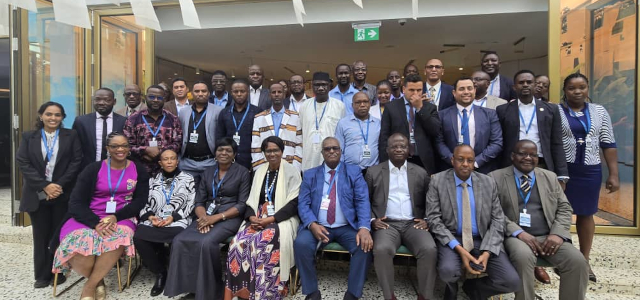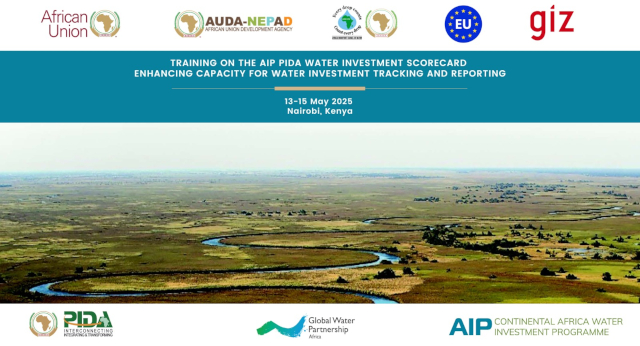The AIP-PIDA Water Investment Scorecard was adopted by the African Union Development Agency-(AUDA-NEPAD) as part of the Programme for Infrastructure Development in Africa (PIDA) in February 2022 through African Union Decision Assembly/AU/Dec.818(XXXV). Among others, the tool aims to enhance mutual accountability for results in the mobilisation of water investments, mobilise political and leadership commitment, support countries to track progress, identify bottlenecks, and take action to meet the investment needs for the achievement of SDG 6 on water and sanitation.
The training took place in Nairobi, Kenya, from 13 to 15 May 2025 and was also attended by the African Union Commission (AUC), AUDA-NEPAD, the African Ministers Council for Water (AMCOW), the AIP Secretariat, as well as experts from the Global Water Partnership Southern Africa (GWPSA), the World Bank and UN agencies.

Participants at the training on how to use the AIP PIDA Water Investment Scorecard to track and report water investments which took place in Nairobi, Kenya
The Scorecard was developed and piloted in ten countries in 2023 and is now being rolled out across all AU Member States.
The hybrid training which was held under the Blue Africa Transboundary Water Management in Africa Action Project and funded by the European Union, was organised by the AUC and the Africa Water Investment Programme (AIP) Secretariat in collaboration with AUDA-NEPAD and AMCOW.
Dr. Nancy Koech, Deputy Director of Transboundary Waters at Kenya’s Ministry of Water and Sanitation, reaffirmed the host country’s commitment: “Kenya is committed to the implementation of continental and regional commitments, declarations, policies and strategies around climate-resilient water security in Africa. Kenya participated in the development and piloting of the Scorecard.”
As part of the AIP, the AUC is supporting Member States in developing climate-resilient water investment programs. Eleven Member States are currently preparing these programs. The Scorecard will facilitate the process of developing the programs by identifying bottlenecks for water investment.
Mr. Harsen Nyambe, Director for Sustainable Environment and Blue Economy at the AUC, highlighted the Scorecard’s role in the wider policy ecosystem.
“The Scorecard is also important in identifying gaps for the development of the Africa Water Policy and post-2025 Africa Water Vision. The upcoming PANAFCON-3 meeting in Zambia will provide a platform for stakeholders to review drafts for these two important documents,” said Mr. Nyambe, who was represented at the meeting by Dr. Ahmed Khalid Eldaw, Water, Climate Change, and Gender Policy Advisor at the AUC.
The Scorecard tracks progress across three pillars: the enabling environment for water investments, the mobilization of water investments and financing, and the performance and sustainability of investments. The Nairobi training featured thematic sessions, breakout discussions, and experience sharing to guide participants through practical use of the Scorecard and launch the 2025 data collection campaign.
AUDA-NEPAD urged AU Member States to champion the scorecard nationally, designate focal points and integrate it into their planning and budgeting, and use its data to strengthen their investment cases to the world.
“Within the transformative blueprint of PIDA, water infrastructure is the bedrock. But targets mean little without the tools to measure, drive, and ensure delivery. The AIP PIDA Water Investment Scorecard is more than just data; it's our practical compass to accelerate progress and strengthen PIDA implementation,” said Ibrah Wahabou, Senior Program Officer, AUDA-NEPAD.
The AIP-PIDA Water Investment Scorecard is aligned with the African Water and Sanitation Sector Monitoring and Reporting System (WASSMO) managed by AMCOW and the African Union's Agenda 2063 to track Africa’s progress on implementing continental and global commitments on water and sanitation. The framework also recognizes AUDA-NEPAD's efforts to ensure that PIDA transboundary water projects implementation is accelerated through enhancing mutual accountability amongst partners. The next reporting cycle is due in August 2025.
“We still have gaps in our reporting systems. We therefore need to work with partners to close the monitoring and reporting gaps. While AIP and partners are working to address the financial gaps, we still have the challenge of closing the information gaps,” said Mr. Nelson Gomonda, AMCOW Director of Programmes.
The training equipped participants with practical knowledge of the AIP PIDA Scorecard’s indicators and three pillars: the enabling environment for water investments, the mobilization of water investments and financing, and the performance and sustainability of investments. It is expected that Member States will now initiate 2025 data collection using the existing indicators.
